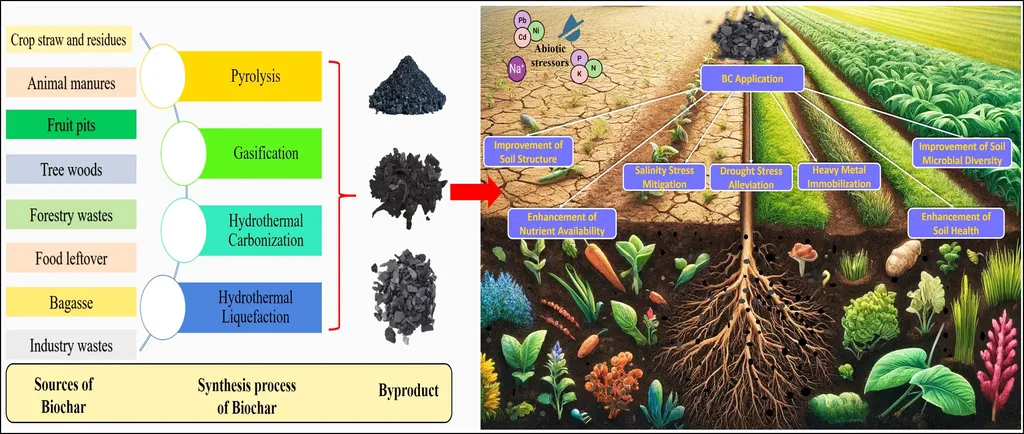In the face of escalating drought conditions threatening global agriculture, a groundbreaking study led by Yuan Zhang from the University Engineering Research Center of Watershed Protection and Green Development at Guilin University of Technology in China offers a promising solution. Published in the journal *Frontiers in Plant Science* (translated as “Plant Science Frontiers”), the research explores the potential of walnut shell biochar to enhance tomato plant resilience under drought stress, with implications that could reverberate through the energy and agricultural sectors.
Drought stress is a formidable challenge, reducing crop productivity and jeopardizing food security. Traditional soil amendments often fall short in mitigating these effects, but biochar—a carbon-rich product derived from agricultural waste—has emerged as a beacon of hope. Zhang’s study delves into the impact of walnut shell biochar (WS biochar) on tomato plants (Solanum lycopersicum) subjected to both severe and moderate drought conditions.
The research reveals that WS biochar, applied at rates of 3% and 5% (w/w), significantly enhances plant growth and resilience. “The biochar’s high fixed carbon content and porous structure improve soil water retention, which is crucial under drought conditions,” explains Zhang. Under severe drought (45% field capacity), the 5% biochar treatment boosted plant height by 24%, increased leaf production, and mitigated a 92% biomass reduction. Moreover, root systems exhibited 30% longer primary roots and 25% higher lateral root density, indicating a robust enhancement in root architecture.
The study also highlights the biochar’s role in modulating stress-related hormonal responses. Proline and abscisic acid (ABA) are key markers of oxidative stress. Biochar treatments reduced proline accumulation by 18% and ABA levels by 22% under severe drought, suggesting a significant alleviation of stress.
These findings underscore the potential of WS biochar as a sustainable, climate-smart soil amendment. “The improvements in root development, biomass, and physiological stress responses point to a promising avenue for enhancing crop performance in water-limited environments,” says Zhang. The research not only offers a practical solution for farmers but also aligns with the broader goals of sustainable agriculture and climate resilience.
The commercial implications for the energy sector are substantial. As the demand for renewable and sustainable energy sources grows, biochar production from agricultural waste presents an opportunity to create value-added products. The energy sector can leverage this technology to develop biochar-based soil amendments, contributing to a circular economy where waste is transformed into a resource.
Looking ahead, the study recommends further field studies to confirm the long-term benefits of WS biochar on soil health and yield. As the world grapples with the challenges of climate change and food security, innovations like biochar offer a glimmer of hope. By integrating these findings into agricultural practices, we can pave the way for a more resilient and sustainable future.
In the words of Yuan Zhang, “This research is just the beginning. The potential of biochar to revolutionize agriculture and contribute to a sustainable future is immense.” As we stand on the precipice of a new era in agritech, the journey towards a greener, more resilient world has never looked more promising.

